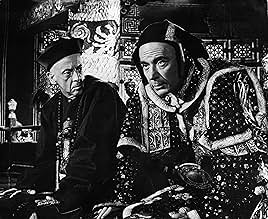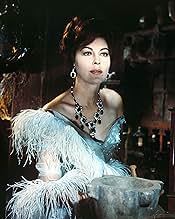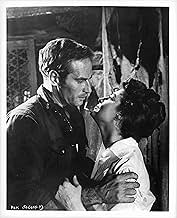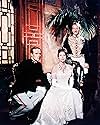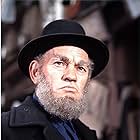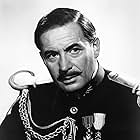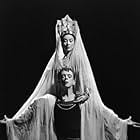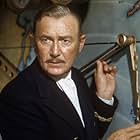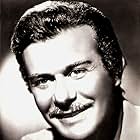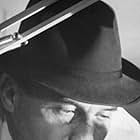IMDb RATING
6.7/10
7.6K
YOUR RATING
During the 1900 Boxer Rebellion, U.S. marine, Maj. Matt Lewis, along with British consul, Sir Arthur Robertson, develop a plan to keep the rebels at bay until an international military relie... Read allDuring the 1900 Boxer Rebellion, U.S. marine, Maj. Matt Lewis, along with British consul, Sir Arthur Robertson, develop a plan to keep the rebels at bay until an international military relief force can arrive.During the 1900 Boxer Rebellion, U.S. marine, Maj. Matt Lewis, along with British consul, Sir Arthur Robertson, develop a plan to keep the rebels at bay until an international military relief force can arrive.
- Nominated for 2 Oscars
- 5 nominations total
Joseph Fürst
- Capt. Hanselman
- (as Joseph Furst)
Storyline
Did you know
- TriviaThis movie was shot in Spain and needed hundreds of Chinese extras, and the company sent scouts throughout Spain and the rest of Europe to hire as many Asian-looking actors and actresses that they could find. The casting web in 1962 reached as far as London, Lyon, and Marseilles, so the result was that many Chinese restaurants in those cities closed for the summer 1962 during filming because the restaurant staff - often including the restaurant's owners - was hired away by the movie company. The company hired so many, that for several months, there was scarcely a Chinese restaurant to be found open in Spain and those three other cities.
- GoofsAt the beginning, the German band plays Deutschland Uber Alles, which was not adopted by Germany until after World War I. Germany at that time used the anthem Heil Dir Im Siegerkranz, whose tune is that of God Save The Queen, while Austria-Hungary used the Deutschland tune for its anthem, Gott Erhalte Franz Den Kaiser.
- Quotes
German Ambassador: You have to admire Sir Arthur; he always manages to give the impression that God must be an Englishman.
- Alternate versionsTo receive a 'U' certificate in the UK (making the film suitable for all ages) significant cuts were made by the BBFC. These included the scene of the priest being drowned by the water-wheel, a shortening of the screaming sounds made by the soldier before his leg amputation, and a removal of all references by Lewis to local women being made available for soldiers. To retain the same certificate all video releases also featured the same cut print. The 2014 DVD features the uncut version and is upgraded to a PG.
- ConnectionsFeatured in I'm a Stranger Here Myself (1974)
- SoundtracksSo Little Time
(The Peking Theme)
Recorded by Andy Williams on CBS Records
Words by Paul Francis Webster
Music by Dimitri Tiomkin
Featured review
This movie fits comfortably in the epic category of the 1950s-1960s - historically based with exotic locales. Thus, we had Dr. Zhivago, Ben Hur, War and Peace, Lawrence of Arabia, Le Cid, Julius Caesar, Nicholas and Alexandra, The Agony and the Ecstasy, Taras Bulba, The Robe, Bridge on the River Kwai, A Man for All Seasons, The Sand Pebbles, Cleopatra, Spartacus, Samson and Delilah, The Brothers Karamazov, Becket. My guess is that if you like most of these movies, you'll like this one.
I'd like to correct some misstatements on this board about the setting of the movie.
Unlike most of the world, China was never a colony - nor part of any empire other than its own. (Do not confuse this with India or much of Africa - the situations were very different!).
The impetus from the West (until well into the 19th century, the West really meant Britain) was from the beginning simply a desire to trade freely with China. Free trade was seen by late 18th and 19th century Britain as far more than an economic benefit to the world - but one that promoted peace, progress, and international good-will. Moreover, China had for centuries been fabled for its wealth.
At first, the Manchu Emperors did not mind trade (from foreigners whom they very much regarded as inferiors - "monkeys" was a common term) - so long as the foreigners were kept strictly at a distance. Thus, for example, the British were strictly limited in where they could live (a tiny enclave in the city of Canton), they could not bring their wives (to make the stays temporary), they were barred from learning Chinese.
The British merchants (and Britain was the world's greatest trading nation) found the restrictions chafing, irrational, primitive and of course profit-reducing. There was little demand in China for British finished goods, but British merchants gradually found a product for which there was enormous Chinese demand -- opium, which the Manchu Emperors had banned. However, the Emperors did not enforce the ban very strictly - in part because they made money from all trade (there were heavy taxes on the foreigners) - thus the government officials would deliberately send out their coast guard boats long after the British ships had unloaded and sold the opium at the wharves, fire one or two cannon shots from out of range, and report that they had "scared the British ship away".
However, internal pressure from reformist groups in China caused the Manchu Emperors to feel they had to act far more forcefully against the trade - and they twice declared war against Britain (the two "Opium Wars" were separated by some 20 years) to "punish" them. In declaring war, the Manchus were entirely ignorant of how primitive the Chinese navy and shore batteries would be against the British Navy - who swiftly and crushed the Chinese forces.
The resulting peace treaties were disastrous to China's exclusionary policy - the wars' peace terms required China to open up four, and then nine, small separate enclaves within coastal cities (the "Concessions") for westerners to live, bring their families, police themselves within the enclaves under their own laws, begin their own industries in those enclaves - and permit foreign missionaries to enter, travel, proselytize freely and establish missions in China.
Moreover, the peace terms required that Britain be authorized to collect and turn over all the trade duties on behalf of the Chinese. (The last unexpectedly proved a boon to the Chinese Court - the efficient and honest British customs collections more than tripled the Court's revenues).
The loss of the wars obviously was a great humiliation to the Chinese who had always regarded China as the center of the universe (the "Middle Kingdom") and their emperors as appointed by Heaven to rule the earth. (Beijing for example has the "Temple of the Sun" at one side, the "Temple of the Moon" on the other, the curved "Temple of Heaven" to the south).
In the mid-19th century, a revolution began in the center of the country against the Manchus - in part due to the humiliation from the loss of the wars - it was savagely put down - and the Chinese massacres of the missionaries caused Britain to respond by burning the palace where the revolt began to the ground.
Meanwhile, other nations such as the U.S., France, Germany, Italy, Japan all began to compete with Britain in trading with China. Indeed, this was, for example the source of the wealth of the Roosevelt family in New York - and led to a great sentimental fondness for FDR during World War II. The China trade became one of the great romantic escapist careers for Americans seeking adventure -- the "China clipper" ships built in the U.S. became world-renowned - as did the courage and skill of their skippers.
America soon began to out-strip all other nations in sending missionaries to China - throughout the U.S., churches raised money and their prayers to support the Chinese missions where the congregants were assured the missionaries were doing God's work. And in fact, millions of Chinese were converted to Christianity and benefited from local charity provided by the missionaries.
Such famous Americans as Henry Luce (founder of Time, Life and Fortune), novelists John Hersey and Pearl Buck, the diplomats John Stewart Service and John Paton Davies - were all children of missionaries, grew up in China and were extraordinarily fond of the Chinese. Back home, Americans heard from those who visited the missions about all the wonderful work they performed, the need to continue their contributions for the Lord's work, and the gratitude of the Chinese.
By the late 19th century, Russia and Japan sought to carve areas out of the obviously weak China. In 1895, Japan crushed China in a local war - and took Korea, Taiwan, railroad and industrial licenses in Manchuria. Russia seized Outer Mongolia and demanded industrial concessions in northern coastal China. The British and other European nations failed to object - but the U.S., sentimental about the Chinese, reacted strongly to the foreign incursions - and Secretary of State John Hay pronounced the "Open Door" policy, insisting that no nation should obtain territorial advantages or further exclusive concessions in China. Popular sentiment in America was fiercely pro-Chinese and against the Japanese and Russian "brutes". Japan was finally forced by the American-led western powers to disgorge some of its gains from the war.
This was the situation at the time of the Boxer Rebellion - western powers were freely trading with China, and had begun great industries in their concession areas in nine coastal cities - meanwhile many Chinese were humiliated by their failure to have kept the foreigners completely out of China - yet many others flocked to the foreign concessions where they were employed in sweatshop conditions in foreign industry. The coastal cities exploded in population due to Chinese migration to work for the foreign industries.
Millions of other Chinese had very much grown up around the thousands of Christian missions situated throughout the country - and felt Christianity to be the more "modern" progressive religion because it was associated with the West which had proved itself more powerful and prosperous. This aroused equally hostile feelings among other Chinese toward the Christian religion and its missionaries, associating such "foreign" culture with Chinese humiliation at foreign hands and resenting the very implication from the missions' existence that the Chinese were backward and must be taught by the foreigner.
The Boxers were a fanatical and murderous semi-religious sect (best seen as like the Mahdi's Dervishes in Sudan or the Wahabbi sect of Islam that bedevils the Saudis today) so named by the westerners due to the closed fists of the sect's adherents. They swore to kill all the foreigners and to drive them out of the country. They were in no sense a positive force - merely a fierce and frenzied organization of hate for the West and all its ways.
Naturally, the Boxers' primary target was missionaries and the Chinese Christian converts -- they were defenseless and located throughout the country. The torture, rape and massacres of the missionaries and converts of course aroused outrage back in the U.S. and Britain - where tens of millions had contributed to "help the Chinese" all their lives -and now they and the charitable subjects of their savings - were being slaughtered.
The Western powers took no military action - but to evacuate as many missionaries as possible - and attempt to persuade/threaten the Manchu court to put down the rebellion itself. The Manchu court was undecided, split between those who believed the Boxers could throw out the foreigner and restore China's pride - and those who believed that if they sided with the Boxers and lost, the western nations would themselves take victorious action and the Manchu court would wind up paying a price in further concessions.
And so our movie begins!
I'd like to correct some misstatements on this board about the setting of the movie.
Unlike most of the world, China was never a colony - nor part of any empire other than its own. (Do not confuse this with India or much of Africa - the situations were very different!).
The impetus from the West (until well into the 19th century, the West really meant Britain) was from the beginning simply a desire to trade freely with China. Free trade was seen by late 18th and 19th century Britain as far more than an economic benefit to the world - but one that promoted peace, progress, and international good-will. Moreover, China had for centuries been fabled for its wealth.
At first, the Manchu Emperors did not mind trade (from foreigners whom they very much regarded as inferiors - "monkeys" was a common term) - so long as the foreigners were kept strictly at a distance. Thus, for example, the British were strictly limited in where they could live (a tiny enclave in the city of Canton), they could not bring their wives (to make the stays temporary), they were barred from learning Chinese.
The British merchants (and Britain was the world's greatest trading nation) found the restrictions chafing, irrational, primitive and of course profit-reducing. There was little demand in China for British finished goods, but British merchants gradually found a product for which there was enormous Chinese demand -- opium, which the Manchu Emperors had banned. However, the Emperors did not enforce the ban very strictly - in part because they made money from all trade (there were heavy taxes on the foreigners) - thus the government officials would deliberately send out their coast guard boats long after the British ships had unloaded and sold the opium at the wharves, fire one or two cannon shots from out of range, and report that they had "scared the British ship away".
However, internal pressure from reformist groups in China caused the Manchu Emperors to feel they had to act far more forcefully against the trade - and they twice declared war against Britain (the two "Opium Wars" were separated by some 20 years) to "punish" them. In declaring war, the Manchus were entirely ignorant of how primitive the Chinese navy and shore batteries would be against the British Navy - who swiftly and crushed the Chinese forces.
The resulting peace treaties were disastrous to China's exclusionary policy - the wars' peace terms required China to open up four, and then nine, small separate enclaves within coastal cities (the "Concessions") for westerners to live, bring their families, police themselves within the enclaves under their own laws, begin their own industries in those enclaves - and permit foreign missionaries to enter, travel, proselytize freely and establish missions in China.
Moreover, the peace terms required that Britain be authorized to collect and turn over all the trade duties on behalf of the Chinese. (The last unexpectedly proved a boon to the Chinese Court - the efficient and honest British customs collections more than tripled the Court's revenues).
The loss of the wars obviously was a great humiliation to the Chinese who had always regarded China as the center of the universe (the "Middle Kingdom") and their emperors as appointed by Heaven to rule the earth. (Beijing for example has the "Temple of the Sun" at one side, the "Temple of the Moon" on the other, the curved "Temple of Heaven" to the south).
In the mid-19th century, a revolution began in the center of the country against the Manchus - in part due to the humiliation from the loss of the wars - it was savagely put down - and the Chinese massacres of the missionaries caused Britain to respond by burning the palace where the revolt began to the ground.
Meanwhile, other nations such as the U.S., France, Germany, Italy, Japan all began to compete with Britain in trading with China. Indeed, this was, for example the source of the wealth of the Roosevelt family in New York - and led to a great sentimental fondness for FDR during World War II. The China trade became one of the great romantic escapist careers for Americans seeking adventure -- the "China clipper" ships built in the U.S. became world-renowned - as did the courage and skill of their skippers.
America soon began to out-strip all other nations in sending missionaries to China - throughout the U.S., churches raised money and their prayers to support the Chinese missions where the congregants were assured the missionaries were doing God's work. And in fact, millions of Chinese were converted to Christianity and benefited from local charity provided by the missionaries.
Such famous Americans as Henry Luce (founder of Time, Life and Fortune), novelists John Hersey and Pearl Buck, the diplomats John Stewart Service and John Paton Davies - were all children of missionaries, grew up in China and were extraordinarily fond of the Chinese. Back home, Americans heard from those who visited the missions about all the wonderful work they performed, the need to continue their contributions for the Lord's work, and the gratitude of the Chinese.
By the late 19th century, Russia and Japan sought to carve areas out of the obviously weak China. In 1895, Japan crushed China in a local war - and took Korea, Taiwan, railroad and industrial licenses in Manchuria. Russia seized Outer Mongolia and demanded industrial concessions in northern coastal China. The British and other European nations failed to object - but the U.S., sentimental about the Chinese, reacted strongly to the foreign incursions - and Secretary of State John Hay pronounced the "Open Door" policy, insisting that no nation should obtain territorial advantages or further exclusive concessions in China. Popular sentiment in America was fiercely pro-Chinese and against the Japanese and Russian "brutes". Japan was finally forced by the American-led western powers to disgorge some of its gains from the war.
This was the situation at the time of the Boxer Rebellion - western powers were freely trading with China, and had begun great industries in their concession areas in nine coastal cities - meanwhile many Chinese were humiliated by their failure to have kept the foreigners completely out of China - yet many others flocked to the foreign concessions where they were employed in sweatshop conditions in foreign industry. The coastal cities exploded in population due to Chinese migration to work for the foreign industries.
Millions of other Chinese had very much grown up around the thousands of Christian missions situated throughout the country - and felt Christianity to be the more "modern" progressive religion because it was associated with the West which had proved itself more powerful and prosperous. This aroused equally hostile feelings among other Chinese toward the Christian religion and its missionaries, associating such "foreign" culture with Chinese humiliation at foreign hands and resenting the very implication from the missions' existence that the Chinese were backward and must be taught by the foreigner.
The Boxers were a fanatical and murderous semi-religious sect (best seen as like the Mahdi's Dervishes in Sudan or the Wahabbi sect of Islam that bedevils the Saudis today) so named by the westerners due to the closed fists of the sect's adherents. They swore to kill all the foreigners and to drive them out of the country. They were in no sense a positive force - merely a fierce and frenzied organization of hate for the West and all its ways.
Naturally, the Boxers' primary target was missionaries and the Chinese Christian converts -- they were defenseless and located throughout the country. The torture, rape and massacres of the missionaries and converts of course aroused outrage back in the U.S. and Britain - where tens of millions had contributed to "help the Chinese" all their lives -and now they and the charitable subjects of their savings - were being slaughtered.
The Western powers took no military action - but to evacuate as many missionaries as possible - and attempt to persuade/threaten the Manchu court to put down the rebellion itself. The Manchu court was undecided, split between those who believed the Boxers could throw out the foreigner and restore China's pride - and those who believed that if they sided with the Boxers and lost, the western nations would themselves take victorious action and the Manchu court would wind up paying a price in further concessions.
And so our movie begins!
- How long is 55 Days at Peking?Powered by Alexa
Details
Box office
- Budget
- $9,000,000 (estimated)
- Runtime2 hours 34 minutes
Contribute to this page
Suggest an edit or add missing content





